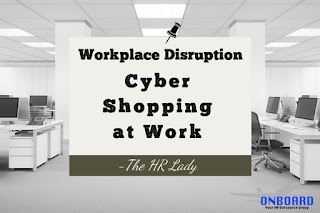Workplace Disruption: Cyber Shopping at Work
Holiday sales look different this year, and some retailers are starting online sales this week. In a 2018 study, over two-thirds of employees plan to shop online while at work during the holiday season. This means employers should have a plan to navigate the next few weeks to maintain productivity and minimize disruption. Here are three things employers should consider.
1. Online Shopping May Not Be a Big Deal
As the holiday shopping season draws near, employers may not need to fret over the potential loss of productivity. In reality, Cyber Monday may not be any different than an average day. Employees might already spend time on non-work-related Internet activities during their typical workday.
Additionally, simply enforcing the organization's policies and placing restrictions on Internet usage may not have the desired effect. This is because many employees will use their personal smartphones and tablets—rather than company equipment—to hunt for Cyber Monday deals.
Under these circumstances, it may be best to simply expect that employees will be shopping during work in the upcoming weeks. However, it is important that employers:
- Enforce productivity and quality standards on Cyber Monday—just as they would any other day—to ensure that online shopping does not sidetrack employees from completing their appointed work.
- Remind employees to avoid suspicious websites or applications to prevent potential data breaches.
2. Communication Is Crucial
Regardless of how employers choose to proceed, they should make sure that the organization's handbook and policies are in order. First, make sure the rules are provided to all employees. Have workers provide an electronic signature or signed acknowledgement page for their employee file as proof that they received a copy of the policies.
Additionally, take a moment to ensure that the rules are clear. If the organization has an outright ban against online shopping on work computers, make sure that the prohibition is explicitly stated in the policies. If employers would like the ability to search all company-issued equipment, they should make sure that their authority to do so is contained in the handbook.
If employees can use company-issued computers, smartphones and tablets for personal purposes during their lunch or break, employers should make that clear. Even if they allow employees the freedom to browse online (so long as they do so in moderation, refrain from accessing inappropriate content, and complete their work), employers should spell that out in the handbook.
3. Consistency Is Key
As always, one of the best ways to avoid legal troubles is to be consistent with the enforcement of policies. Put another way, if an employer drops the hammer on one employee for breaking a specific rule, it must drop the hammer on any other employee that also breaks that same rule. Consider the following scenario:




Comments
Post a Comment